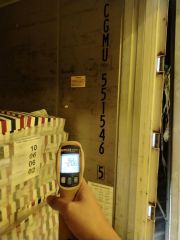Can someone help me where I can find articles, references, etc. related to standard operation for trucking (reefer van)?. If its standard that the reefer must be ON while loading or unloading of products. By the way we are HACCP certified. Also, our implemented SOP is that after the truck pre cooling, the van temperature will be subject for checking, and if it passes, the truck engine will automatically shut off and start loading the products. Similar to unloading of products, after checking the van temperature the assigned personnel for receiving the item will call the driver to go to the designated dock. After docking, the driver will turn off the reefer truck.
Thank you in advance.
- Home
- Sponsors
- Forums
- Members ˅
- Resources ˅
- Files
- FAQ ˅
- Jobs
-
Webinars ˅
- Upcoming Food Safety Fridays
- Upcoming Hot Topics from Sponsors
- Recorded Food Safety Fridays
- Recorded Food Safety Essentials
- Recorded Hot Topics from Sponsors
- Food Safety Live 2013
- Food Safety Live 2014
- Food Safety Live 2015
- Food Safety Live 2016
- Food Safety Live 2017
- Food Safety Live 2018
- Food Safety Live 2019
- Food Safety Live 2020
- Food Safety Live 2021
- Training ˅
- Links
- Store ˅
- More




















